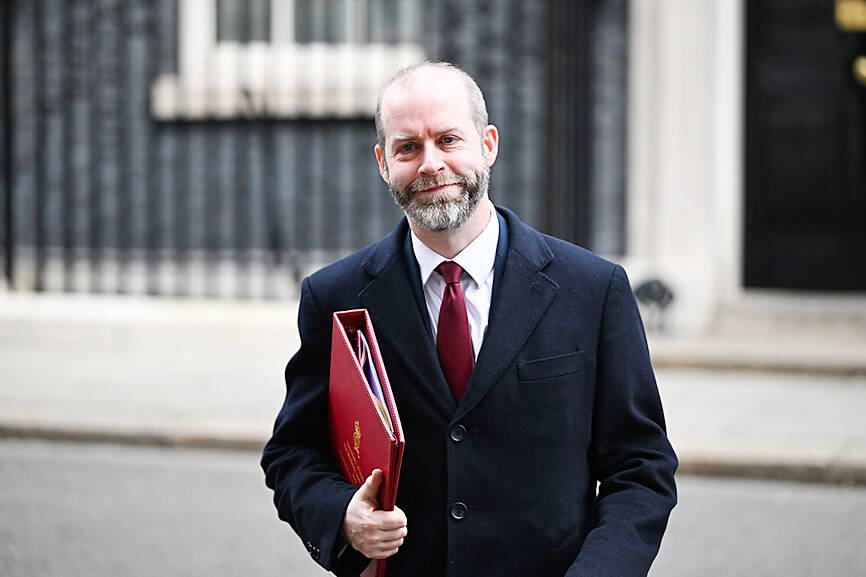The British government is weighing plans to reduce or even abolish its digital services tax before Wednesday next week to avoid the worst of US President Donald Trump’s trade tariffs.
The British Treasury is considering several options for modifying the so-called tech tax that were proposed by the British Department for Business and Trade, a person briefed on the discussions said.
The possible changes do not include company-specific carve-outs, the person said.

Photo: Bloomberg
The discussions come after the US administration raised their opposition to the tax as part of talks on a “new economic deal” which Trump and British Prime Minister Keir Starmer agreed to explore last month.
The levy is charged at 2 percent of the revenues derived from British users by search engines, social media companies and online marketplaces, making it unpopular with US firms such as Google parent Alphabet Inc, Facebook and Instagram owner Meta Platforms Inc, and Amazon.com Inc.
Trump is conducting a review of all US trading partners, with a view to imposing “reciprocal” tariffs on Wednesday next week in response to anything he deems a tariff or a non-tariff barrier to trade.
British Secretary of State for Business and Trade Jonathan Reynolds on Tuesday last week met in Washington with US administration officials including US Secretary of Commerce Howard Lutnick, US Trade Representative Jamieson Greer and special envoy Mark Burnett.
One person familiar with the discussions said Reynolds was hoping to reach an agreement with the US on the tech levy before Wednesday next week and secure an exemption from further tariffs.

TARIFFS: The global ‘panic atmosphere remains strong,’ and foreign investors have continued to sell their holdings since the start of the year, the Ministry of Finance said The government yesterday authorized the activation of its NT$500 billion (US$15.15 billion) National Stabilization Fund (NSF) to prop up the local stock market after two days of sharp falls in reaction to US President Donald Trump’s new import tariffs. The Ministry of Finance said in a statement after the market close that the steering committee of the fund had been given the go-ahead to intervene in the market to bolster Taiwanese shares in a time of crisis. The fund has been authorized to use its assets “to carry out market stabilization tasks as appropriate to maintain the stability of Taiwan’s

STEEP DECLINE: Yesterday’s drop was the third-steepest in its history, the steepest being Monday’s drop in the wake of the tariff announcement on Wednesday last week Taiwanese stocks continued their heavy sell-off yesterday, as concerns over US tariffs and unwinding of leveraged bets weighed on the market. The benchmark TAIEX plunged 1,068.19 points, or 5.79 percent, to 17,391.76, notching the biggest drop among Asian peers as it hit a 15-month low. The decline came even after the government on late Tuesday authorized the NT$500 billion (US$15.2 billion) National Stabilization Fund (國安基金) to step in to buoy the market amid investors’ worries over tariffs imposed by US President Donald Trump. Yesterday’s decline was the third-steepest in its history, trailing only the declines of 2,065.87 points on Monday and

TAKING STOCK: A Taiwanese cookware firm in Vietnam urged customers to assess inventory or place orders early so shipments can reach the US while tariffs are paused Taiwanese businesses in Vietnam are exploring alternatives after the White House imposed a 46 percent import duty on Vietnamese goods, following US President Donald Trump’s announcement of “reciprocal” tariffs on the US’ trading partners. Lo Shih-liang (羅世良), chairman of Brico Industry Co (裕茂工業), a Taiwanese company that manufactures cast iron cookware and stove components in Vietnam, said that more than 40 percent of his business was tied to the US market, describing the constant US policy shifts as an emotional roller coaster. “I work during the day and stay up all night watching the news. I’ve been following US news until 3am

Six years ago, LVMH’s billionaire CEO Bernard Arnault and US President Donald Trump cut the blue ribbon on a factory in rural Texas that would make designer handbags for Louis Vuitton, one of the world’s best-known luxury brands. However, since the high-profile opening, the factory has faced a host of problems limiting production, 11 former Louis Vuitton employees said. The site has consistently ranked among the worst-performing for Louis Vuitton globally, “significantly” underperforming other facilities, said three former Louis Vuitton workers and a senior industry source, who cited internal rankings shared with staff. The plant’s problems — which have not